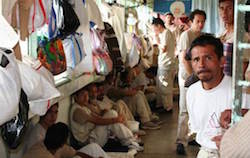Overcrowding in Mexico City’s prisons has fallen by 69 percent over the last four months thanks to reforms in the criminal justice system that could offer a solution for other Latin American countries with overpopulated penitentiary systems.
According to Hazael Ruiz Ortega, the Undersecretary for Mexico City’s Penitentiary System, the reduction is due to a reclassification of the types of crimes that are considered jailable offenses, reported El Universal.
In January, Mexico’s Federal District reformed the criminal justice system so that several offenses — such as domestic disputes, arguments between neighbors, threats, and physical fights resulting in minor injuries — no longer go to trial. In addition, individuals accused of armed robbery or manslaughter resulting from negligence can now post bond instead of spending time in jail while criminal proceedings are underway.
The reforms have reportedly had a huge impact on Mexico City’s prison population, where at least 20,582 — or 54 percent — of the Federal District’s 38,160 inmates are behind bars for some type of robbery, according to government statistics cited by El Universal. Ruiz Ortega noted that petty theft like the robbery of auto parts worth around $30 or less used to result in one to two year sentences, “saturating the country’s prisons”.
InSight Crime Analysis
Mexico has long struggled with growing inmate populations and serious overcrowding in its prisons, and is currently in the midst of implementing judicial reforms. These problems have been exacerbated by the fact that 95 percent of all crimes are punishable by prison sentences in Mexico, and by the widespread use of pre-trial detention, which has resulted in inmates waiting in jail for several months before charges are even filed against them.
Overcrowding has also led to deplorable conditions, contributing to riots and violence among inmates, and allowing gangs to take control of an estimated 65 percent of the country’s prisons.
SEE ALSO: Coverage of Prisons
These problems affect prison systems throughout Latin America. Indeed, the widespread practice of pre-trial detention in other parts of the region has also resulted in endemic overcrowding. In addition, gangs and other criminal groups use prisons as a base of operations to conduct criminal activities like extortion, and to recruit and train new members.
Several countries have recently taken steps to address these issues, the most recent example being Colombian President Juan Manuel Santos’ May 19 announcement of the allocation of $480 million to improve the country’s prison system.
While increased investment in prisons will likely help improve conditions, changes in sentencing guidelines like the ones implemented in Mexico City could prove an effective and low-cost model for reducing overcrowding in other Latin American countries.

